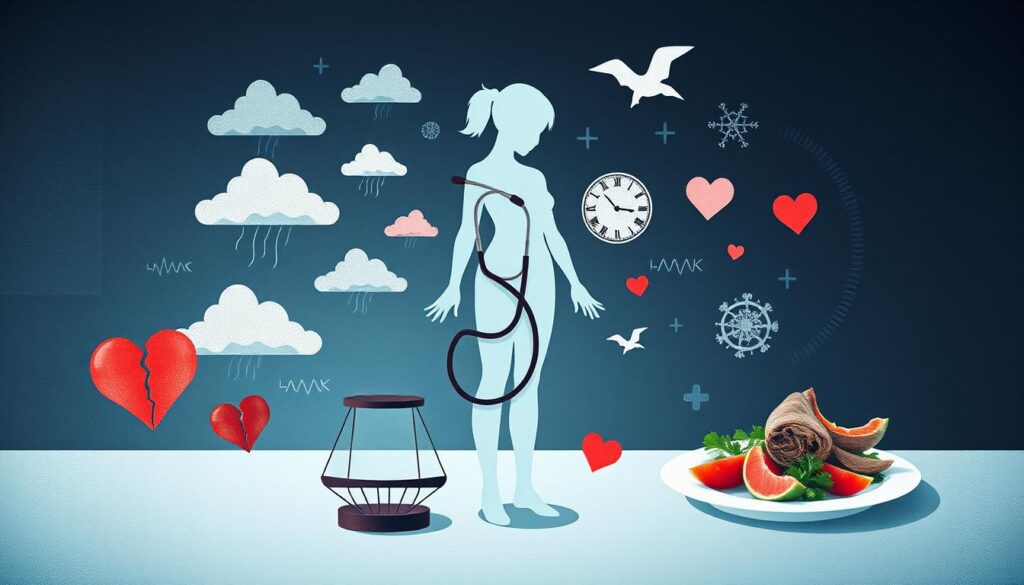Unexplained weight loss can be scary and frustrating. It often means there’s a health problem that needs quick help. If your clothes feel looser or the scale shows a drop without trying, it’s important to know why.
Weight loss without trying, like losing 10 pounds in a few months, can mean serious illness. It could be something simple like depression or a big problem like cancer. It’s all about knowing the signs and how they affect your health.
Key Takeaways
- Unintentional weight loss can be a sign of an underlying health condition.
- Common causes include depression, infections, and digestive disorders.
- Less common but more serious causes include cancer, diabetes, and autoimmune diseases.
- Significant weight loss can lead to malnutrition and other health complications.
- Consulting a healthcare professional is crucial for identifying and treating the underlying cause.
Understanding Unexplained Weight Loss: An Overview
Unexplained weight loss is a big worry for many. It often means there’s a health issue that needs to be checked. Significant weight loss is when you lose 10% of your body weight in 6 months. This can be a sign of serious health problems.
Knowing the signs and how it affects your health is key. It helps tackle this serious health issue.
Defining Significant Weight Loss
Significant weight loss is losing 10 pounds (4.5 kilograms) or 5% of your body weight in 6 to 12 months. This kind of weight loss can mean there’s a health issue. It could be anything from chronic illnesses to mental health problems.
Common Signs and Symptoms
- Changes in appetite, either increased or decreased
- Unexplained fatigue or weakness
- Alterations in physical appearance, such as a noticeable loss of muscle or fat
Impact on Overall Health
Weight loss symptoms can really affect your health. Losing weight without trying can show there’s a health problem. Losing 5% to 10% of your body weight in 6 months can be good. It can help with blood sugar, blood pressure, and cholesterol.
But losing weight too fast or a lot can be risky. It’s important to get help if you’re losing weight without trying.
“Unexplained weight loss is typically defined as a decrease of 10 pounds (4.5 kilograms) or 5% of one’s normal body weight over a period of 6 to 12 months.”
If you or someone you know is losing a lot of weight without trying, see a doctor. Finding out why and fixing it can make you healthier and happier.
Weight Loss Illnesses Causes: Medical Conditions and Their Effects
Unexplained weight loss can be scary. It often means there’s a health problem. Many chronic diseases can cause weight changes without us wanting them. Knowing the reasons is key to finding the right treatment.
Thyroid dysfunction is a big reason for weight loss. Too much thyroid hormone makes you lose weight fast. Too little makes you gain weight.
Diabetes and blood sugar issues can also affect weight. Uncontrolled diabetes burns fat and muscle for energy, leading to weight loss. Some diabetes medicines can also make you lose weight.
Stomach problems like Crohn’s disease, celiac disease, and chronic pancreatitis can stop your body from getting nutrients. This leads to weight loss. These issues can also cause nausea, vomiting, and diarrhea, making weight loss worse.
Cancer and its treatments, like chemotherapy, can cause weight loss too. The cancer might make you lose weight or not want to eat. Treatment side effects can also make it hard to keep a healthy weight.
Mental health issues, like depression and anxiety, can also affect your appetite. Stress and emotional problems can mess up your eating habits. This can hurt your health and well-being.
Finding out why you’re losing weight is very important. Doctors might suggest changes in diet, medicine, or refer you to specialists. This helps find and fix the weight loss problem.
“Unintentional weight loss can be a sign of a serious underlying condition, so it’s important to consult with a healthcare professional to determine the cause and receive proper treatment.”
Knowing about medical reasons for weight loss helps us take care of ourselves. We can act early to keep our health and well-being.
Metabolic Disorders and Weight Changes
Metabolic disorders can really mess with your weight. They can make you gain or lose weight without you wanting to. These issues, like thyroid problems, diabetes, and hormonal imbalances, need doctor help to keep your weight right.
Thyroid Dysfunction
Thyroid problems, especially hyperthyroidism, can make you lose weight without trying. This is because your thyroid gland makes too many hormones. These hormones speed up your metabolism. Getting the right treatment for thyroid issues is key to controlling your weight.
Diabetes and Blood Sugar Imbalances
Diabetes can also make you lose weight. If your body can’t use glucose right, it might use fat and muscle instead. Keeping your blood sugar in check with food, medicine, and lifestyle changes can help with weight issues from diabetes.
Hormonal Disorders
Hormonal imbalances, like those from the adrenal or pituitary glands, can cause weight changes. These problems can mess with your body’s metabolism, leading to weight gain or loss. Getting medical help and following a treatment plan is important for managing weight with hormonal issues.
Fixing metabolic disorders, thyroid dysfunction, diabetes, and hormonal imbalances is key to a healthy weight. Talking to a doctor is important to find the right treatment for you.
Digestive System Disorders and Malabsorption
Digestive system disorders can cause weight loss because of not absorbing nutrients. Celiac disease, inflammatory bowel disease, and chronic pancreatitis make it hard to get nutrients from food. This can lead to losing a lot of weight, not getting enough nutrients, and other health problems. It’s important to find and treat these digestive disorders to manage weight loss and improve gut health issues.
Malabsorption syndrome is a term for many disorders that affect nutrient absorption. It can be caused by chronic diseases, intestinal surgeries, or long-term antibiotic use. Symptoms include belly pain, diarrhea, and losing weight without trying.
- Conditions like celiac disease, cystic fibrosis, and Crohn’s disease can make malabsorption worse.
- Lacking vitamins like A and zinc can hurt the immune system and growth. So, it’s key to absorb nutrients well.
- To find out if you have malabsorption, doctors might do stool tests, lactose hydrogen breath tests, and more.
- Treatment depends on the cause. It might include changing your diet, taking supplements, using medicines, or treating infections.
It’s crucial to tackle digestive disorders and malabsorption to stay healthy and at a good weight. Working with doctors can help create a plan to manage these issues and better your gut health issues.
| Malabsorption Type | Symptoms | Potential Causes |
|---|---|---|
| Carbohydrate Malabsorption | Gas, bloating, fatty stools | Incomplete absorption in the small intestine |
| Fat Malabsorption | Steatorrhea (fatty, smelly stools) | Bile-related issues or other problems |
| Bile Acid Malabsorption | Chronic diarrhea | Bile acid issues or other underlying conditions |
| Protein Malabsorption | Symptoms vary | Specific intolerances like milk protein or gluten |
“Malabsorption can result in symptoms such as abdominal discomfort, frequent diarrhea, and weight loss.”
Cancer and Treatment-Related Weight Loss
Cancer can be very hard, leading to unwanted weight loss. This loss can happen for many reasons. It includes the body’s fight against the disease and side effects from treatments.
Types of Cancers Associated with Weight Loss
Some cancers, like lung, pancreatic, and stomach cancers, often cause weight loss. The American Cancer Society says losing 10 pounds without reason might mean you have one of these cancers.
Chemotherapy Effects on Body Weight
Chemotherapy can also lead to weight loss. Side effects like nausea and mouth sores make it hard to eat well. This can hurt a person’s ability to digest food.
Nutritional Challenges During Treatment
- Stress and depression can also make it hard to eat and feel full.
- Mouth sores make it tough to chew and swallow food.
- Nausea and vomiting from chemotherapy can also cause weight loss.
- Other issues like early feeling full and pain can also lead to weight loss.
Keeping a healthy weight while fighting cancer is very important. Getting help from a nutritionist can help manage these challenges. They can help find ways to prevent and manage weight loss.
| Factors Contributing to Cancer-Related Weight Loss | Strategies to Manage Weight Loss |
|---|---|
|
|
Understanding why cancer causes weight loss helps. By using the right strategies, cancer patients can keep their weight and health during treatment.
Mental Health Conditions Affecting Weight
Mental health plays a big role in weight loss. Depression can change how much we eat, leading to weight loss. Eating disorders like anorexia and bulimia cause fast and harmful weight loss. Stress and anxiety can also mess with our appetite and metabolism, affecting our weight.
The connection between mental health and weight is complex. Since the 1980s, adult obesity rates have doubled. Over 42% of U.S. adults are obese. People with mood disorders, schizophrenia, ADHD, and trauma often struggle with obesity too.
It’s important to tackle mental health to manage weight and overall health. Combining physical health care with mental health treatment helps with weight gain from mental illness. Eating right, exercising, and managing stress are key to a healthy weight and better mental health.
“The relationship between obesity and depression appears to be bidirectional and more substantial in women compared to men.”
In summary, mental health and weight changes are linked in a complex way. We need a complete approach to treat and manage this. By focusing on both mind and body, we can achieve better health and happiness.

Medication-Induced Weight Changes
Some medicines can make you lose or gain weight. It’s key to know this to stay healthy.
Common Medications Causing Weight Loss
Some meds make you lose weight. These include stimulants, antidepressants, and diabetes or thyroid meds. Weight loss can be a few pounds a year or more in a few months.
Managing Medication Side Effects
If your meds make you lose or gain weight, talk to your doctor. They might change your dose or switch meds. Knowing side effects before starting a new med helps you prepare.
Alternative Treatment Options
There might be other treatments that don’t affect your weight as much. Your doctor can help find these and plan a treatment that works for you.
| Medication | Potential Weight Effect |
|---|---|
| Stimulants | Weight loss |
| Antidepressants | Weight loss or gain |
| Diabetes medications | Weight loss or gain |
| Thyroid medications | Weight loss |
| Psychiatric medications | Weight gain |
Working with your doctor is key to handle weight changes. This way, you can keep a healthy weight and feel better.
Nutritional Deficiencies and Their Impact
Nutritional deficiencies can harm your health. They can cause unexplained weight loss and other health problems. Common issues include vitamin B12, iron, folate, and zinc deficiencies.
These problems can come from not eating enough, not absorbing nutrients well, or certain health conditions. Signs include feeling tired, weak, and changes in how hungry you are. Fixing these issues with food or supplements is key to staying healthy and at a good weight.
Macronutrient and Micronutrient Deficiencies
Protein-energy malnutrition can lead to serious problems like marasmus and kwashiorkor. This affects about one-third of kids worldwide. It can make babies underweight, weak, and more likely to get sick.
Deficiencies in iron, folate, zinc, iodine, and vitamin A can hurt your brain, growth, and health. Even in places with good food, people might not get enough nutrients. This can cause diseases like cancer, weak bones, and heart problems.
Addressing Nutritional Deficiencies
- Eat a diet full of green, leafy veggies to get more vitamins.
- If you’ve had weight-loss surgery, you might need daily supplements.
- Pregnant women should take extra folic acid to get enough folate.
- Talking to a doctor or nutritionist can help avoid nutritional problems by half.
Fixing nutritional issues and eating well can keep you healthy. It also helps avoid weight-related sicknesses.

Conclusion: Managing Weight Loss Illnesses and Treatment Options
Dealing with weight loss illnesses is complex. Finding the cause and making a treatment plan is key. This helps you manage your health better.
It might mean fixing medical issues, changing meds, eating better, and getting mental health help.
Seeing doctors often is crucial for managing weight loss. They check your progress and adjust your plan. This ensures you’re on the right path.
Treatment depends on your illness’s cause. It might include medicine, diet changes, and lifestyle tweaks.
Spotting problems early helps avoid big issues. Working with your healthcare team is vital. Together, you can make a plan that works for you.
Remember, your health journey is special. With the right support, you can beat challenges and reach your health goals.


A Life-Changing Experience with This Weight Loss Supplement (Nagano Tonic)
I’ve always struggled with finding a weight loss solution that actually works for me. Like many, I’ve tried numerous diets, exercise routines, and supplements over the years—some worked for a short time, but nothing ever gave me long-term results. That was until I decided to try the weight loss supplement I found : Link to the Supplement.
From the moment I started using it, I noticed a difference. Not only did I feel more energized, but my cravings also became more manageable. The best part? I started seeing results much quicker than I anticipated! Over the course of just a few weeks, I noticed a significant reduction in belly fat and overall weight loss that I hadn’t been able to achieve before.
What makes this supplement stand out from all the others I’ve tried is how it supports me in my daily routine without any jitters or energy crashes. I’m able to stay focused and motivated, which has made it easier to stay on track with my diet and exercise plan.
This product truly exceeded my expectations, and I feel more confident and healthier than ever before. If you’re struggling with your weight loss journey like I was, I highly recommend giving this supplement a try. It’s been a game-changer for me, and I’m sure it can work wonders for you too!
Contant Them on email .. tonicnagano50@gmail.com
I’ve tried so many weight loss products over the years, but nothing worked like this supplement! Since I started using it, I’ve noticed a big difference in my energy levels and appetite control. In just a few weeks, I’ve lost weight and feel so much better. It’s been easy to stick with, and the results speak for themselves. Highly recommend this to anyone looking to make a real change!
wasn’t sure what to expect, but this weight loss supplement has really impressed me! After just a few weeks of use, I’ve already dropped a few pounds and feel more motivated to stay active. It’s helped curb my cravings and boosted my energy throughout the day. I’m excited to keep going and see even better results. Definitely worth trying!
Reach them on tonicnagano50@gmail.com
I was skeptical at first, but this supplement has truly made a difference in my weight loss journey. I’ve lost weight without feeling deprived or sluggish. My cravings are under control, and I feel more confident in my body. It’s easy to incorporate into my daily routine, and the results speak for themselves. I’m so glad I gave it a try!
Thanks David, i do use the link to make my purchase. you can get too here http://surl.li/iasppy
I’ve tried so many weight loss products, but this one has been by far the most effective. In just a few weeks, I’ve noticed a visible difference in my body and energy levels. It’s helped me stay on track without the constant hunger pangs and cravings. I’m really happy with my progress and can’t wait to see where I’ll be in another month!
This Nagano Tonic has been amazing! In just a few weeks, I’ve lost weight, feel more energized, and my cravings are under control. Highly recommend it!
Thats the link to purchase http://surl.li/iasppy